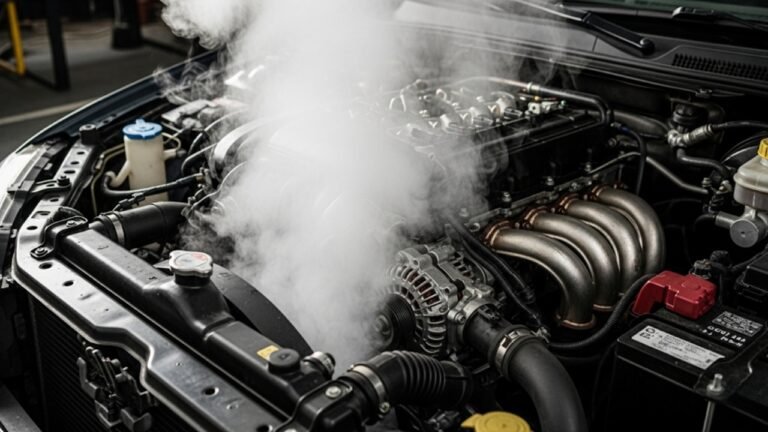Can You Use Full Synthetic Oil in Any Car?

I still remember that day vividly. My old Toyota was coughing like it had a cold. I popped the hood in a gas station parking lot, sweat mixing with stress. A kind stranger said, “Maybe you need better oil—try full synthetic.” But the thought hit me—can you use full synthetic oil in any car? I had no idea.
We’ve all been there—faced with engine choices that feel more like chemistry class than car care. It’s not just about changing oil anymore. It’s about knowing your engine’s needs, your car’s past, and whether a fancy new bottle of full synthetic oil is the right move.
Let me walk you through what I learned—not from just reading manuals, but from real experience, mechanics’ advice, and a few hard lessons. And yes, I’ll keep the language simple and human, just like we’re chatting over tea, not in an auto shop waiting room filled with jargon.
What Is Full Synthetic Oil, Really?

Full synthetic oil is engineered in labs, not just refined from crude oil like conventional types. It’s tailor-made to perform better—especially in extreme temperatures or under high engine stress.
It has fewer impurities, better molecular structure, and more additives that fight sludge and friction. Think of it like premium skincare for your engine—it goes deeper and lasts longer.
Here’s how it stacks up:
| Oil Type | Source | Performance | Change Interval |
|---|---|---|---|
| Conventional Oil | Crude oil | Basic protection | 3,000 – 5,000 miles |
| Synthetic Blend | Crude + synthetic | Moderate performance | 5,000 – 7,000 miles |
| Full Synthetic Oil | Lab-engineered | High-temp & cold-weather power | 7,500 – 15,000 miles |
So, it’s better. But does that mean it’s right for every car? That’s where things get interesting.
Older Engines: The Biggest Debate Around Full Synthetic
Here’s the truth. The debate over can you use full synthetic oil in any car usually starts with older engines.
Let me tell you about my friend Rayhan. He owns a 1995 Nissan Sentra. It runs like a champ, but when he tried switching to full synthetic oil, it started leaking—not because the oil was bad, but because the gaskets were old and worn.
You see, full synthetic oil is slicker. It flows faster and finds every nook and cranny in your engine. On an older car, that can mean oil leaks, especially if the seals are cracked or brittle.
But here’s the nuance—the oil didn’t cause the damage. It just exposed it. So if your old car is well-maintained, you can switch. But do a seal check first. Maybe even replace the valve cover gasket if it’s been a while.
That said, some old engines just like what they’re used to—like grandma preferring her classic tea over a chai latte. And that’s okay. There’s no one-size-fits-all.
Newer Cars? They Practically Beg for Synthetic
Now, if your car was built in the last decade, chances are it’s made for full synthetic. Manufacturers design engines today with tight tolerances, meaning everything fits snugly and moves fast. These engines generate more heat and operate under more pressure.
In fact, many car manuals recommend or even require full synthetic oil. If you’re driving a turbocharged vehicle or a high-performance engine, using conventional oil can actually reduce its life.
Here’s a short list of cars that often require full synthetic:
-
BMW (most models from 2000+)
-
Audi and Volkswagen (especially turbocharged engines)
-
Honda Civic Type R
-
Ford EcoBoost engines
-
Chevrolet Corvette
-
Toyota Supra
So if you’re asking, can you use full synthetic oil in any car, and your car’s less than 10 years old? Yes—most likely, it’s not just safe, it’s ideal.
Benefits of Switching to Full Synthetic Oil (Even Mid-Life)
Okay, so maybe your car didn’t start with synthetic oil. Maybe it’s 7 years old, has 100,000+ miles, and you’re wondering if it’s too late.
Here’s the good news—it’s never too late if your engine is healthy.
Making the switch can give you:
-
Longer oil change intervals (which saves time and money)
-
Better fuel efficiency (because of less drag inside the engine)
-
Smoother starts in cold weather
-
Cleaner engine internals (synthetic has excellent detergent properties)
-
Reduced wear and tear
Think of it like switching from cheap sneakers to well-cushioned running shoes. You don’t need them when you’re walking slow. But once you start pushing the limits—or time catches up—you’ll feel the difference.
And trust me, my Toyota went from a sluggish start to a quiet purr after just one oil change. No, it wasn’t magic. It was science—and care.
When You Shouldn’t Use Full Synthetic Oil
Now, let’s be real—not every situation demands full synthetic. I wouldn’t be doing you justice if I didn’t mention when it might not be worth it.
Here are some times to pause:
-
Your car is on its last leg. If you’re selling or scrapping soon, why spend extra?
-
Your manual recommends conventional oil. Yes, you can upgrade, but if you’re on a tight budget, it’s not essential unless driving in harsh conditions.
-
Your engine has oil leaks or bad seals. Fix those first before switching. Synthetic oil will just highlight the flaws.
-
You change oil often anyway. For high-mileage city drivers, changing conventional oil every 3,000 miles might be more practical than spending more on synthetic.
So yes, you can use full synthetic oil in any car—but ask yourself if it’s the smart choice.
High-Mileage Engines: The Gray Zone
I get asked this all the time—“What if my car has 150,000+ miles? Is it too risky?”
Not necessarily.
There’s a class of oil called high-mileage synthetic. These blends include seal conditioners and extra detergents specifically formulated for older engines. They’re the bridge between safety and performance.
Mechanics often suggest synthetic for high-mileage engines because it reduces sludge, which can choke oil passages. I’ve seen engines come back to life—quieter, smoother, even cooler—just from using high-mileage synthetic oil.
That said, always check with a trusted mechanic or run a leak test first. You don’t want surprises.
Diesel, Hybrid, or Classic Car? Compatibility Scenarios That Matter
Oil isn’t one-size-fits-all—and neither are engines. So let’s get specific about different vehicle types and whether full synthetic is a good idea.
Diesel Engines
Diesel engines work harder. They often run hotter, have higher compression, and demand more robust oil. In most cases, full synthetic diesel oil is not only compatible but necessary, especially in modern diesel vehicles.
Synthetic oil resists breakdown better and handles soot and heat far more efficiently than conventional diesel oils. Brands like Shell Rotella T6 or Mobil 1 Turbo Diesel Truck are trusted synthetic options.
If you drive long distances or haul heavy loads, your diesel engine will thank you for going synthetic.
Hybrid Vehicles
Hybrid engines switch frequently between electric and gas power. That stop-and-go pattern leads to frequent engine startups, which means friction. Synthetic oil reduces wear during cold starts and idling.
Many Toyota Prius, Honda Insight, and Ford hybrid models already recommend 0W-20 full synthetic from the factory. So yes, you absolutely can and should use full synthetic in a hybrid.
Classic or Vintage Cars
This one’s a bit more nuanced.
Cars from the ‘60s, ‘70s, or even early ‘80s were built in a different era. They often relied on mineral-based oils and had softer seals. That said, if the engine has been rebuilt or modified, full synthetic is often fine—and might even improve performance.
But if you’re keeping the car all-original? It’s safer to stick with what it was born with—or use high-zinc synthetic blends, which protect older flat-tappet cams.
Bottom line: Know your engine’s history. Synthetic is amazing, but context matters.
Full Synthetic vs Synthetic Blend: Which One Wins?
So you’re convinced that synthetic might help—but now you’re torn between full synthetic and synthetic blend. Let’s break it down like comparing filtered coffee to espresso.
| Feature | Synthetic Blend | Full Synthetic |
|---|---|---|
| Price | Medium | High |
| Protection | Good | Excellent |
| Cold/Hot Performance | Moderate | Superior |
| Oil Change Frequency | 5,000 – 7,000 miles | 7,500 – 15,000 miles |
| Best For | Daily drivers, older cars | High-performance & newer cars |
If your car is relatively modern and you drive long distances, go with full synthetic. If you’re driving a workhorse that’s a bit older or on a budget, synthetic blend gives a nice middle ground.
I used synthetic blend in my sedan during university. It worked well. But once I started highway commuting, switching to full synthetic felt like upgrading from dial-up to WiFi. Everything ran smoother.
Common Myths About Synthetic Oil (Busted)
People avoid synthetic oil for strange reasons. Let’s bust a few car myths you’ve probably heard:
“Synthetic oil causes leaks.”
Nope. It doesn’t cause leaks—it just exposes existing problems. If your seals are old or cracked, synthetic will find the gaps faster. That’s not the oil’s fault—it’s your engine asking for TLC.
“You can’t switch back once you go synthetic.”
Totally false. You can switch between oil types as long as you use the correct viscosity and specifications. Synthetic won’t “ruin” your engine.
“Full synthetic is a waste of money for old cars.”
Only if the car is dying. If it’s still healthy, full synthetic extends its life. In fact, I’ve seen older engines stay cleaner and quieter with synthetic, especially in Bangladeshi climates where heat and humidity can be brutal.
“All synthetic oils are the same.”
Definitely not. Quality varies. Look for brands with API SN/SM or ACEA certifications, and always match your car’s spec sheet.
Real-Life Stories: What Happens When You Make the Switch
Let’s get real for a second.
I once helped a single mom, Asha, switch her 2010 Corolla from conventional to full synthetic. She was nervous—her car was nearing 200,000 km. But guess what? Within a week, the engine was quieter, and her fuel mileage improved. She now swears by synthetic and says her car “feels younger.”
Another friend, Arif, made the mistake of switching to synthetic in his 1991 Civic without checking his seals. His engine started leaking oil. Moral? Check seals, then switch. Don’t blame the oil for doing its job better.
These aren’t made-up stories. They’re real people with everyday cars who faced the same question: can you use full synthetic oil in any car? And the answer was “yes”—but with understanding.
Is the Extra Cost Worth It? Let’s Talk Value
Let’s crunch the numbers for a second.
A full synthetic oil change might cost $20–$30 more than conventional. But you also get twice the mileage. So if you’re spending $60 every 5,000 km on conventional, and $90 every 10,000 km on synthetic—you’re actually saving time and reducing waste.
More importantly, synthetic oil:
-
Lowers long-term engine wear
-
Helps avoid major engine repairs
-
Boosts fuel economy
Think of it like paying a little more upfront for peace of mind. Like buying a better mattress—you only feel the value over time.
How to Make the Switch Safely
If you’re ready to switch to full synthetic oil, here’s a simple plan:
-
Check Your Owner’s Manual – It tells you the oil spec and viscosity.
-
Inspect Engine Seals – Look for signs of leakage or gasket wear.
-
Do a Clean Oil Change – Drain old oil completely, replace the filter.
-
Use High-Quality Synthetic Oil – Stick with trusted brands (Mobil 1, Castrol, Valvoline).
-
Monitor for the First 500–1000 km – Watch for leaks or oil level drops.
-
Optional: Use Engine Flush – If your old oil left sludge, an engine flush can help before switching.
Take it slow, be mindful, and your engine will adapt just fine.
Final Thoughts: It’s Not Just Oil—It’s Engine Wellness
So, can you use full synthetic oil in any car? The answer is yes, but it depends on your car’s condition, age, and purpose.
Full synthetic oil is like switching from fast food to a balanced diet. Your engine might not complain with old habits, but it thrives when treated well. Whether you drive a brand-new Tesla, a rugged diesel pickup, or a humble sedan from 2004, the key is to know your engine’s needs.
Personally, I believe in caring for machines like you care for people—attentively, patiently, and with love. Because when your engine runs right, life feels smoother. You start your day with confidence, knowing you’re not cutting corners.
So next time you’re at the service station, and the tech asks if you want to try full synthetic, you can smile and say, “Yes—I know exactly what I’m doing.”






